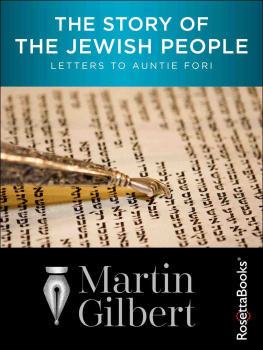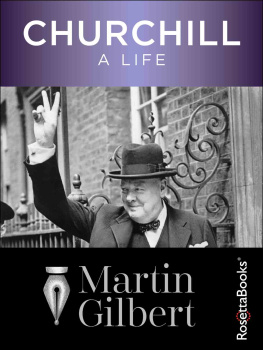The Roots of Appeasement
Martin Gilbert
The Roots of Appeasement
Copyright 1966 by Martin Gilbert
All rights reserved. No part of this book may be used or reproduced in any form or by any electronic or mechanical means, including information storage and retrieval systems, without permission in writing from the publisher, except by a reviewer who may quote brief passages in a review.
Electronic edition published 2015 by RosettaBooks
Cover design by Brehanna Ramirez
Cover image of British Prime Minister Neville Chamberlain receiving the red carpet treatment in Rome from Italian dictator Benito Mussolini, January 1939. Courtesy of The National Archives UK.
ISBN (EPUB): 9780795346804
ISBN (Kindle): 9780795346811
www.RosettaBooks.com
List of Maps
5 German Peacetime Expansion 19191939
These maps were designed by the author and drawn by John Flower.
The aim is to get an appeasement of the fearful hatreds and antagonisms which exist in Europe and to enable the world to settle down. I have no other object in view.
Winston Churchill at the Imperial Conference, 7 July 1921
Appeasement in itself may be good or bad according to the circumstances. Appeasement from weakness and fear is alike futile and fatal. Appeasement from strength is magnanimous and noble, and might be the surest and perhaps the only path to world peace.
Winston Churchill, in the House of Commons on 14 December 1950, during the Korean War
Introduction
In this book I trace the origins of appeasement, and follow its course from 191439. Often those who sought a lenient peace in 1919, or tried to bring Britain and Germany together during the inter-war years, are seen as misguided men who mistook weakness for charity. This was not so: appeasement was a policy of optimism and hope, even at times of strength. Those who believed that every possible effort should be made to improve Anglo-German relations did so, not because they feared German territorial ambitions, but because they respected German national aspirations and admired German cultural and scientific achievements. The arguments for and against appeasement were never simple ones, nor did the debate which raged with acerbity for twenty years fall into any clear categories of right and wrong. My aim is to examine the wide range of the appeasement argument, and to show that appeasement, both as an attitude of mind and as a policy, was not a silly or treacherous idea in the minds of stubborn, gullible men, but a noble idea, rooted in Christianity, courage and common sense.
During the inter-war years appeasement constantly changed in outlook and method. For Lloyd George it was a necessary counterweight to what he considered the excessive anti-Germanism of France. For Ramsay MacDonald it was an essential part of the restoration of European political sanity and economic progress. For Stanley Baldwin it sprang from the belief that tranquillity would come to Europe only if France and her eastern European allies could be prevented from isolating and encircling Germany. Under Baldwin, Britain shunned close co-operation with France. Baldwins Cabinet, much influenced by Churchill, in 1925 rejected a proposed Anglo-French alliance. Diplomats, politicians, and civil servants saw appeasement as the only path to permanent peace in Europe. Post-war frontiers were to be adjusted and post-war animosities whittled away.
Until 1935, the principal tenet of appeasement was concessions through strength. Even for Neville Chamberlain in 1938 appeasement was not so much based upon fear of Germany as upon the belief that further peaceful change in Europe was both desirable and feasible. Chamberlain believed tenaciously that constructive Anglo-German co-operation in and after 1938 could still preserve peace despite Hitlers growing advocacy of violence. In retrospect, appeasement towards Stresemann and Brning seems to have been realistic, appeasement towards Hitler, folly. But although some contemporaries held this view, and held it strongly, Chamberlain denied that Nazism could not be appeased. He doubted that war was inevitable. The idea of the inevitability of war was contrary to the underlying assumptions of appeasement, assumptions upon which British foreign policy since 1918 had been based. Chamberlain was continuing the traditions of his predecessors. That he did so in radically different, unsuitable circumstances, may have been the fault of his judgement, but it was certainly not the fault of his intentions. His aim was to preserve peace in Europe. It was an honourable quest. No British Prime Minister in the inter-war years sought otherwise.
Acknowledgements
I have been helped in assembling material and in reaching my conclusions on the origins of appeasement and its course between the wars by a large number of people, both in conversation and correspondence. Among those who encouraged me to examine appeasement in a broad perspective and gave me an insight into its meaning and methods were Sir Norman Angell, Frank Ashton-Gwatkin, the late Lord Beaverbrook, Professor Max Beloff, Alan Campbell-Johnson, Alan Collingridge, Dr T. P. Conwell-Evans, Sir Colin Coote, Henry Drummond-Wolff, Dr Paul Einzig, G. E. R. Gedye, Sir Basil Liddell Hart, Sir Frederick Leith-Ross, Sir Reginald Leeper, Donald McLachlan, Julian Piggott, Captain George Pitt-Rivers, Lord Strang, Virgil Tilea, Dr Arnold Toynbee, Sir Horace Wilson, and A. P. Young.
In a subject so clouded by controversy it is at times difficult to separate passion and polemic from reality. I have tried to explain and do justice to all opinions, and seek to malign none. The Guilty Men tradition in English historical writing has flourished for over a quarter of a century, and ought now to fade away. The inter-war years deserve to become the objects of more reflective inquiry. Historical assessments are best approached in an atmosphere of relative detachment. In seeking to present a new basis for the study of appeasement in Britain I have been influenced in particular by criticisms of my earlier opinions by Lord Strang and A. J. P. Taylor.
Chronology of Appeasement
1917: 22 January. President Wilson insists upon a peace between equals.
1919: 25 March. Lloyd Georges Fontainebleau Memorandum opposes a punitive peace.
1919: 16 April. Lloyd George explains his policy in the House of Commons.
1919: December. J. M. Keyness Economic Consequences of the Peace published.
1920: 10 January. Ratification of the Treaty of Versailles.
1920: 12 February. First of a series of post-war Anglo-French conferences opens in London.
1922: AprilMay. Genoa Conference. Lloyd George fails to obtain a reparation settlement.
1923: January. Anglo-French clash over Frances occupation of the Ruhr.
1924: 16 July. London Conference on Reparations opened by Ramsay MacDonald.
1925: 16 October. Locarno Agreements signed.
1931: May. European economic crisis intensifies international friction.
1931: November. The Sargent Chain contemplates a wide-ranging settlement.
1932: January. Sir Robert Vansittart proposes Treaty revision in Germanys interest.
1932: June. Lausanne Conference, to end Reparations, opened by MacDonald.
1933: 30 January. Adolf Hitler becomes German Chancellor.
1933: 1 April. Anti-semitic pogrom in Berlin alienates British observers.













